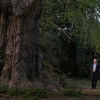
A prosepoem and image by Abdulghani Al-Shuabi
The work gathers me, not as a master gathers his servant, but as the tide gathers the shore—unceasing, insistent, shaping. My heart is not outside the task, nor merely beside it, but within it, fused with the ink, the word, the breath of the classroom. Time does not pass in its ordinary measure here; it stretches, contracts, falters, and surges. A single sentence may take a lifetime; a fleeting lecture may echo for years. What is written, what is spoken, is never only that—it is the light of matches struck unexpectedly in the dark, awakening thought where silence once prevailed.
I do not teach, write, or research as if compelled. Each word rises, each idea unfurls, each question cast into the air trembles with possibility. The rhythm of mind and language is not repetition but revelation: one metaphor recalls another, one insight deepens into the next, widening circles upon the still surface of understanding. The work of the mind is not less physical than the hammer striking iron; it is fire transmuted into thought, the pulse of the invisible beating against the world.
The burden lies not in work itself, but in its absence—the blank page that resists the hand, the classroom where no spark leaps, the research question left unasked. To labour in mind and spirit is to answer, to echo, to resist the silence. Each paper written, each poem conceived, each lesson carried into the minds of students becomes a sanctuary of thought, a hymn without choir, a structure of being that outlives its maker.
And yet, the page is never neutral. Beneath its quiet surface run the veins of history and struggle. Gaza enters through the broken cadence of stones against steel, through lullabies stifled mid-breath, through the olive tree whose roots cling stubbornly to scorched soil. The classroom does not close its doors against the world; echoes of siege and exile seep into the margins, where silenced voices continue their unfinished sentences. Writing becomes not escape but testimony, not detachment but defiance: a lantern lit in the dark, keeping alive what settlers would erase, carrying forward what occupation strives to bury in silence.
If this is folly, then it is the same folly by which the stars burn, the rivers carve, the voices rise. What remains without it? Dust, shadows, brittle echoes. My heart is in the work, not because it must be, but because it cannot be otherwise. And so I continue—as poets continue, as scholars continue, as teachers continue—not for praise, not for reward, but because to do so is to exist, to affirm that meaning is possible, and that the rhythm of thought, like the rhythm of the heart, must not fall silent.













